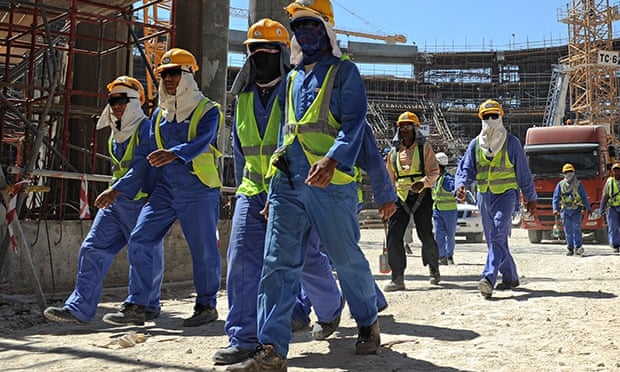Indentured-Style Labour in Qatar
"My family lives in a village outside Kathmandu. My wife and two little children are sleeping on the road. But I can't leave [Qatar]. My employer won't let me go."
"I can't leave because I have to pay back the loan I had taken to get to Qatar."
Nepalese migrant worker in Doha
"We know that people who work long hours in high temperatures are highly vulnerable to fatal heat strokes, so obviously these figures continue to cause alarm."
"It’s Qatar’s responsibility to determine if deaths are related to living and working conditions, but Qatar flatly rejected a DLA Piper recommendation to launch an immediate investigation into these deaths last year."
Nicholas McGeehan, Middle East researcher, Human Rights Watch
 Foreign construction workers on a construction site in Doha, Qatar. Photograph: Str/EPA
Foreign construction workers on a construction site in Doha, Qatar. Photograph: Str/EPA
Contractors in Qatar are permitted to work on rules that resemble nothing so much as slave labour. Foreign workers must hand their passports over to employers once they arrive in Qatar. This is done to prevent the possibility of those workers finding another job with more favourable employment, although that faint hope is unlikely. It also prevents workers from leaving the country until their contract has been fulfilled to their employer's full satisfaction.

Nepalese migrant workers queue to receive official documents in order to leave Nepal from the labour department in Kathmandu. Photograph: Prakash Mathema/AFP/Getty Images
Many workers are compensated poorly. They may also experience problems collecting wages due them. They are housed in fetid, cramped quarters. A labourer from Ghana was recently interviewed claiming that the agent who had recruited him assured him that he would be earning $950 monthly. What he ended up being paid was $250, instead; quite a comedown in expectations.
Qatar has been on the receiving end of quite a few news reports that reflect extremely poorly on employment relations with migrant workers it employs exclusively in the building of the site for the FIFA World Cup scheduled for Qatar in 2022. In the news was the revelation that in 2014 migrant workers from Nepal were dying at the rate of one every second day, as a result of dreadful working conditions.
That figure doesn't take into account the deaths of Indian, Sri Lankan and Bangladeshi workers working to build the World Cup infrastructure. Qatar claims criticism results from racism and Islamophobia. And it is supported by the Confederation of African Football, itself claiming that these "hateful, defamatory and degrading attacks" insult the integrity of CAF "and the entire African continent".
Workers imported to build stadiums, highways and skyscrapers suffer long hours of work, inadequate compensation, poor health care services, miserable accommodation, working under conditions that no first-world country would permit. And Qatar doesn't like the news painting it as a slave-labour country, let alone the criticisms relating to the absurdity of holding such an event in a country whose environment is hot, dry and dusty.
Qatar's vast wealth created Al Jazeera which is tasked with journalistically uncovering unsavoury details about the country's neighbours, much to their dismay. Likely, Qatar's emirs enjoy watching their competitors in oil production squirm with annoyance at revelations unearthed by Al Jazeera. News sourced in Qatar and published in Europe has caused a similar backlash in Qatar.
It has taken to tasking Qatari police to arrest journalists from abroad, holding them in detention and destroying their video footage. In its defence, Qatar cites the fact that foreign journalists must seek permission and a license to operate in Qatar. Journalists cite the fact that their applications go unanswered, so they enter the country anyway.
Labels: Human Relations, Islamophobia, Qatar, Sports

<< Home